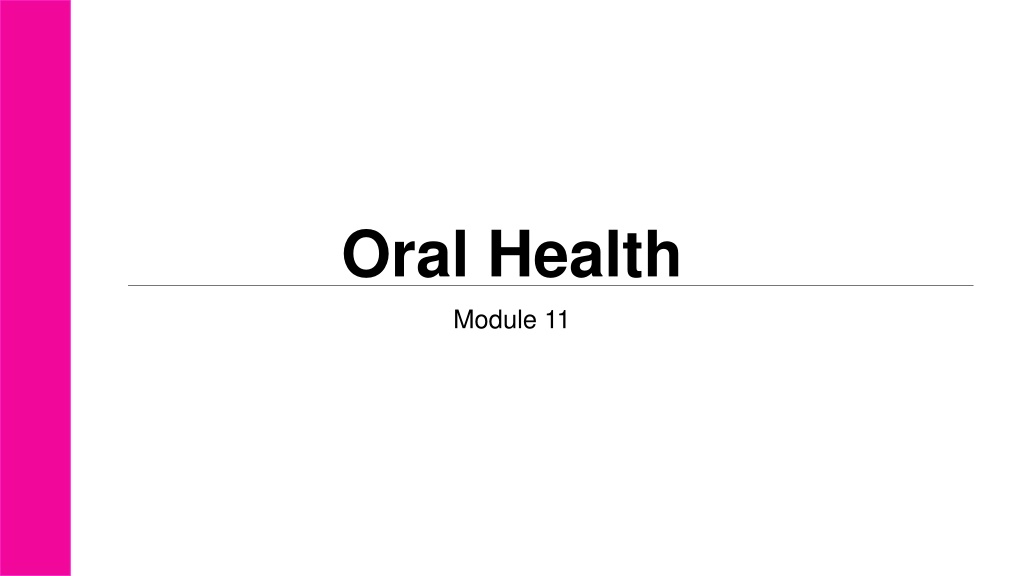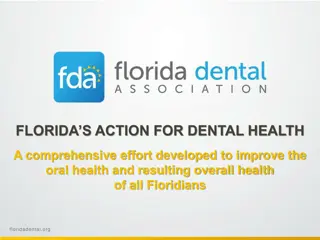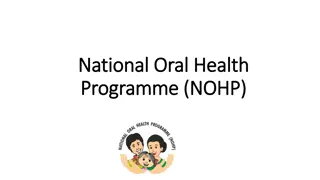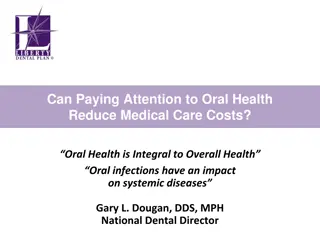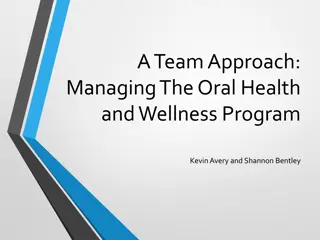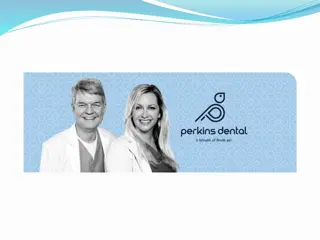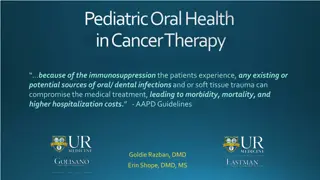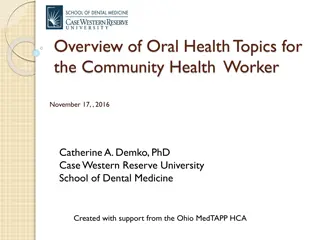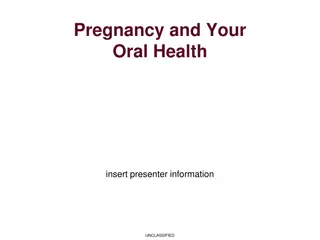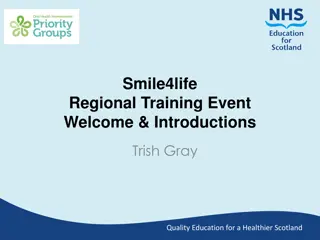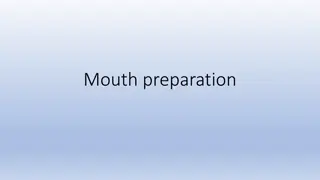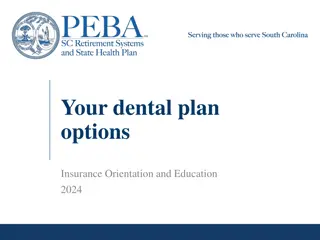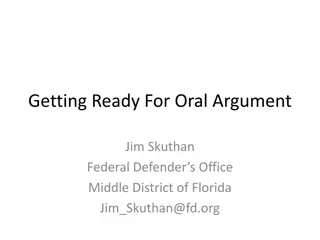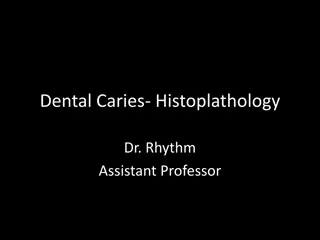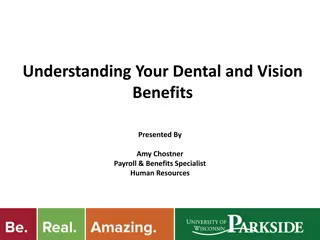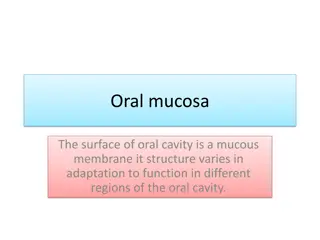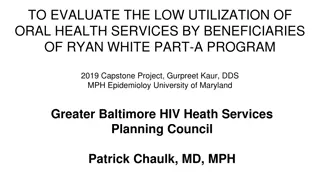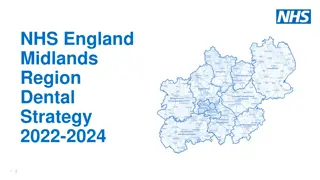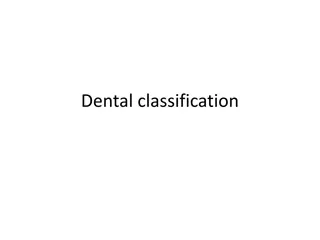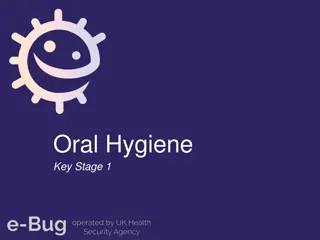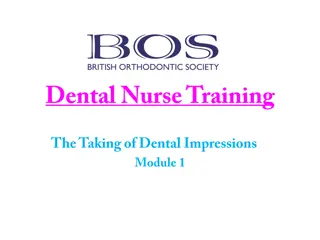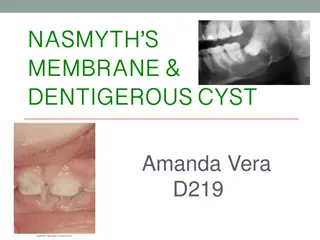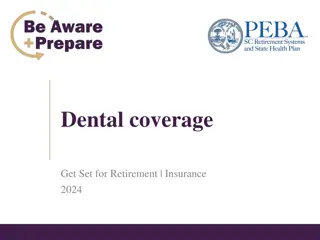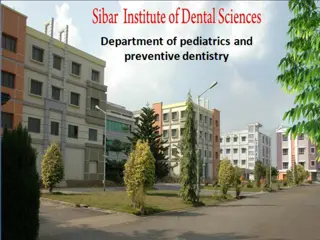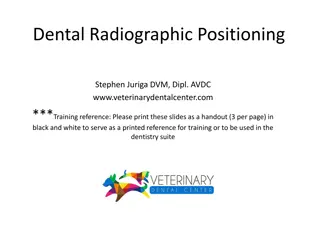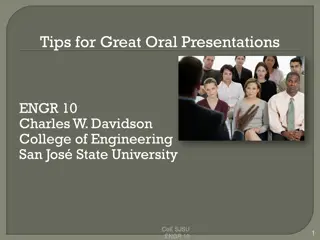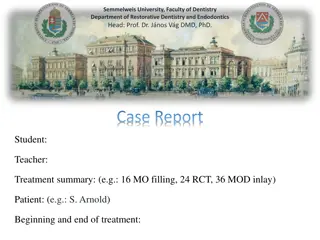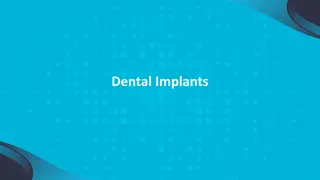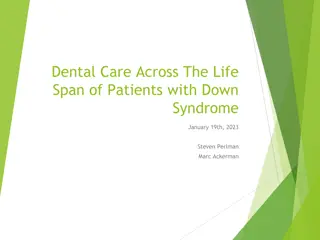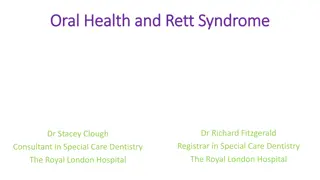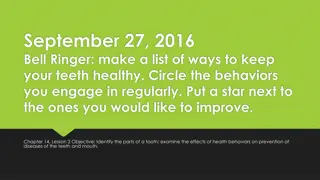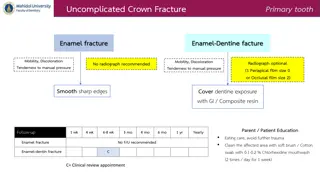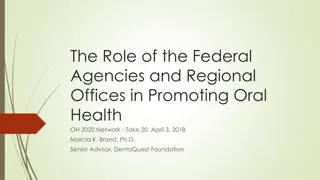Importance of Oral Health and Dental Care Tips
Oral health goes beyond just taking care of your teeth; it involves maintaining your gums, tongue, and overall mouth health. Good oral health not only prevents diseases like cavities and gum disease but also contributes to your confidence, fresh breath, and overall well-being. It plays a vital role in your body's health, protecting important organs like the brain, heart, and lungs. Proper dental care involves making appointments, requesting accommodations, and preparing for your visit to ensure you receive the best oral care possible.
Download Presentation

Please find below an Image/Link to download the presentation.
The content on the website is provided AS IS for your information and personal use only. It may not be sold, licensed, or shared on other websites without obtaining consent from the author. Download presentation by click this link. If you encounter any issues during the download, it is possible that the publisher has removed the file from their server.
E N D
Presentation Transcript
Oral Health Module 11
The Importance of Oral Health Oral health is taking care of your teeth and mouth, which includes your teeth, gums, tongue, and the inside of your cheeks. Oral health is important because: It can help prevent oral diseases like cavities and gum disease. It helps keep your breath smelling fresh and your teeth clean. It helps you feel confident. It helps keep your body healthy and is important for your overall well-being.
Good oral health helps your entire body by: Fighting diseases so you can stay healthy. Playing a role in protecting your brain, heart, and lungs. Keeping illnesses such as arthritis and diabetes from getting worse. Helping a pregnant person have a healthier pregnancy.
What questions do you ask when you are making your dental appointment?
BEFORE: Planning for Your Dental Appointment
Making an Appointment Your health insurance provider can help you find a dentist that is covered under your plan, or can ask someone you trust if they know a dentist that might be a good fit for you. Ask if you need to pay a copay or if you will be expected to pay what you owe the same day as your appointment. When you make an appointment, the receptionist may ask you questions like: When was the last time you saw a dentist? When was the last time you had your teeth cleaned? Have any of your teeth been bothering you?
Requesting Accommodations Some accommodations you may need to consider requesting: Lighting adjustments Large print materials Interpreters Need extra time Wheelchair accessible Do you usually need to be transferred to an exam chair or do you stay in your wheelchair? Ask the dental hygienist and dentist to explain what they are doing before they do it.
What do you do to prepare for your dental appointment?
DURING: The Day of Your Appointment
Preparing for Your Appointment Before your appointment, you may want to: Brush and floss your teeth Wear comfortable clothes Bring an item with you that helps you feel comfortable and relaxed Headphones so you can listen to music or soothing sounds
Preparing for Your Appointment Call ahead to make sure your appointment is on time to reduce waiting time. Remember your paperwork, photo I.D., list of medications, completed forms, and insurance information. Arrive 15 minutes before your appointment, or sooner if the office asks.
At the Dentists Office Every Dentist s office is different. Some of the staff you may meet include: The receptionist will greet you and help you get checked in. The dental hygienist will examine your mouth, head, and neck and clean your teeth. The dentist will examine your teeth to identify and treat any dental problems. They may also have an assistant to help them.
Steps to Brushing Your Teeth Step 1: Put a small pea sized amount of toothpaste with fluoride on your toothbrush. Step 2: In a circle motion, brush the tops of your back teeth.
Steps to Brushing Your Teeth Step 3: Brush the outsides of all your teeth using circle motions. Brush the insides of all your teeth, using the tip of your toothbrush for the back of your front teeth. Also, make sure to brush your gums. Step 4: Brush your tongue.
Steps to Brushing Your Teeth Step 5: Spit into the sink. Step 6: Do not rinse your mouth out with water. Leave toothpaste in your mouth to help keep your teeth strong and fight cavities.
Steps to Brushing Your Teeth Step 7: Rinse your toothbrush off and put it away. Step 8: Wipe your mouth. Note: It is important to brush your teeth for at least 2 minutes! Be sure to change your toothbrush every 3 months or after an illness.
Steps to Flossing Your Teeth Everyone flosses their teeth in different ways. Your dentist will help you find what way works best for you. Flossing your teeth daily is an important part of oral hygiene because it helps to get the food and germs that may be stuck in between your teeth.
What are Cavities? A cavity is an infection in the tooth caused by germs in the mouth. Germs use the sugar and starches in the food you eat to make acid, which can cause holes in your teeth. If not treated by a dentist, these holes can grow bigger and deeper and can: Cause pain Make it difficult to eat, talk, and smile A dentist can fill a cavity with special material.
What Can Cause Cavities and Gum Disease? Eating sugary foods between meals. Certain medications or health conditions. Leaving food and germs and teeth. Poorly controlled diabetes. Tobacco use. Stress
What is Gum Disease? Gum disease is an infection that affects the gums and bone that supports the teeth, which can lead to tooth loss. Most of the time, there are no symptoms in early stages. Your gums might bleed when you brush, but usually there is no pain. As the gums begin to recede, you might have sensitivity to hot and cold temperatures. When bone around the teeth is lost, the teeth will become loose.
Preventing Cavities and Gum Disease It is important to do your best to try and prevent cavities. Here are some ways you can do that: Use fluoride product at home if recommended by your dentist or dental hygienist. Brush your teeth at least twice a day and floss daily. Save sugary foods for mealtime.
Preventing Cavities and Gum Disease In between meals, snack on foods that do not create acid like: Cheese Fresh fruits and vegetables Nuts Have regular dental checkups and cleanings. Always follow your dentist s or dental hygienist s instructions and ask questions if you do not understand. If you have diabetes, follow your medical doctor s advice for managing it.
What are some ways that we can prevent cavities and gum disease?
What Did I Learn? I can take charge of my health care when I know: Why good oral health is important How my oral health affects my whole body What accommodations are best for me and how to ask for them How to care for my teeth and gums What causes cavities and gum disease and how to prevent them
Created in partnership with: Oregon Self Advocacy Coalition, Oregon Health and Science University, and Oregon Council on Developmental Disabilities The toolkit and its components were supported in part by the Grant or Cooperative Agreement Number DD000014, funded by the Centers for Disease Control and Prevention and by the University Center Excellence in Developmental Disabilities Administration on Community Living Grant #90DDUC0039-03-02. Its contents are solely the responsibility of the authors and do not necessarily represent the official views of the Centers for Disease Control and Prevention, Administration on Community Living, or the Department of Health and Human Services.
